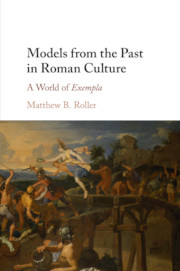Book contents
- Models from the Past in Roman Culture
- Models from the Past in Roman Culture
- Copyright page
- Dedication
- Contents
- Illustrations
- Acknowledgments
- Abbreviations
- Map of the Principal Monuments and Sites Discussed in This Book
- Introduction
- Chapter 1 Horatius Cocles
- Chapter 2 Cloelia
- Chapter 3 Appius Claudius Caecus
- Chapter 4 Gaius Duilius
- Chapter 5 Fabius Cunctator
- Chapter 6 Cornelia
- Chapter 7 Cicero’s House and “Aspiring to Kingship”
- Chapter 8 Conclusion
- Bibliography
- Index Locorum
- General Index
Chapter 5 - Fabius Cunctator
Competing Judgments and Moral Change
Published online by Cambridge University Press: 21 March 2018
- Models from the Past in Roman Culture
- Models from the Past in Roman Culture
- Copyright page
- Dedication
- Contents
- Illustrations
- Acknowledgments
- Abbreviations
- Map of the Principal Monuments and Sites Discussed in This Book
- Introduction
- Chapter 1 Horatius Cocles
- Chapter 2 Cloelia
- Chapter 3 Appius Claudius Caecus
- Chapter 4 Gaius Duilius
- Chapter 5 Fabius Cunctator
- Chapter 6 Cornelia
- Chapter 7 Cicero’s House and “Aspiring to Kingship”
- Chapter 8 Conclusion
- Bibliography
- Index Locorum
- General Index
Summary
- Type
- Chapter
- Information
- Models from the Past in Roman CultureA World of Exempla, pp. 163 - 196Publisher: Cambridge University PressPrint publication year: 2018



